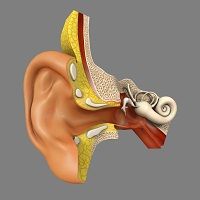How Old Is Too Old for Cochlear Implant Reimplantation?
Some studies have suggested that advanced age may be associated with poor post-revision outcomes in cochlear reimplantation. Investigators from the University of North Carolina at Chapel Hill have completed a study that asks whether advanced age should be a contraindication for revision cochlear implantation.

For people with severe to profound hearing loss, cochlear implants can restore hearing and improve quality of life. Initially FDA-approved in 1985, only individuals with bilateral profound sensorineural hearing loss with no open set speech recognition (in other words, some ability to understand speech without visual clues) were considered viable candidates for cochlear implants. The criteria have become less rigid over time, and more people are eligible including those with more profound residual hearing and pre-implant speech recognition scores. Occasionally, devices fail or medical complications create a need for revision surgery and reimplantation. The incidence of revision surgery is low, but outcomes are variable.
Some studies have suggested that advanced age may be associated with poor post-revision outcomes. Investigators from the University of North Carolina at Chapel Hill have completed a study that asks whether advanced age should be a contraindication for revision cochlear implantation.
The investigators used retrospective analysis at their academic tertiary care center. Participants included 14 younger adults (<65 years, control cohort) and 15 older adults (older than 65 years) who underwent revision cochlear implantation. They compared speech perception performance at the best pre-revision interval and at 3- and 6-month post-revision intervals between the 2 cohorts. They used the consonant-nucleus-consonant (CNC) word test, which includes 10 lists of 50 phonemically balanced monosyllabic words, scored with a range of 0% to 100% correct.
The investigators determined that both cohorts had restored speech perception scores after revision cochlear implantation when compared with their best performance before the revision. In the younger cohort, mean scores were 43.9% before revision, 47.7% at 3 months and 47.6% at 6 months after revision.
Among patients in the older cohort, mean scores also increased steadily from 36.3% before revision to 35.3% at 3 months and 39.9% at 6 months post-revision. They note that other factors may have influenced outcomes, including previous listening experiences and familiarity with the device’s electrical signal.
No significant differences in speech perception performance outcomes were identified between the 2 cohorts. Larger sample sizes might show differences, but revision surgery is quite rare in cochlear implant patients.
The investigators suggest that advanced age should not be considered a contraindication to revision cochlear implantation. This study appears on the online version of JAMA Otolaryngology—Head & Neck Surgery.